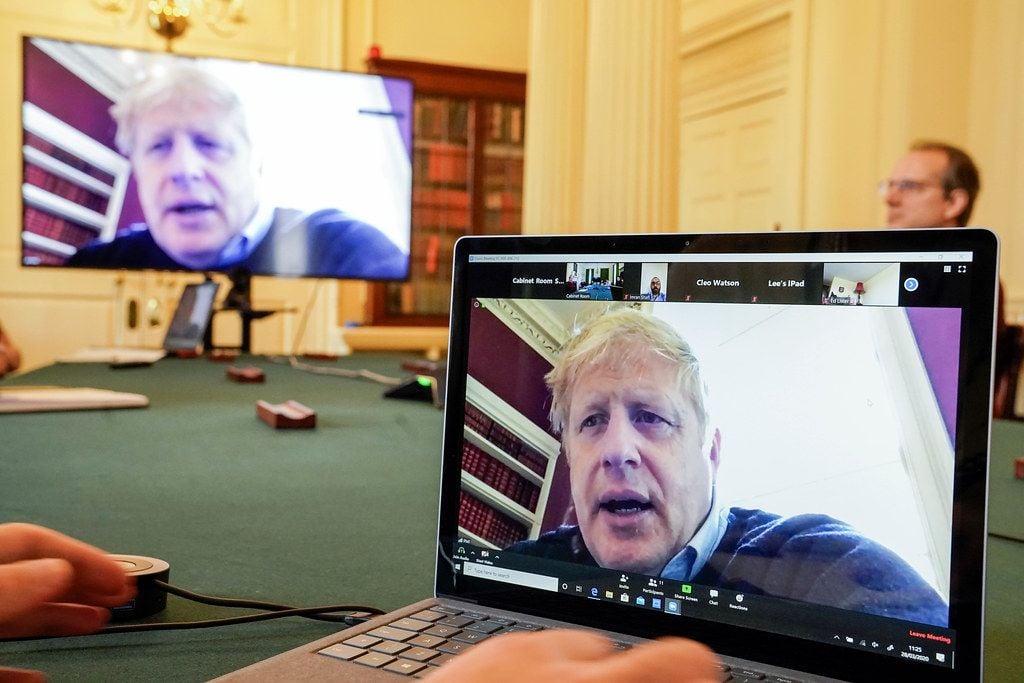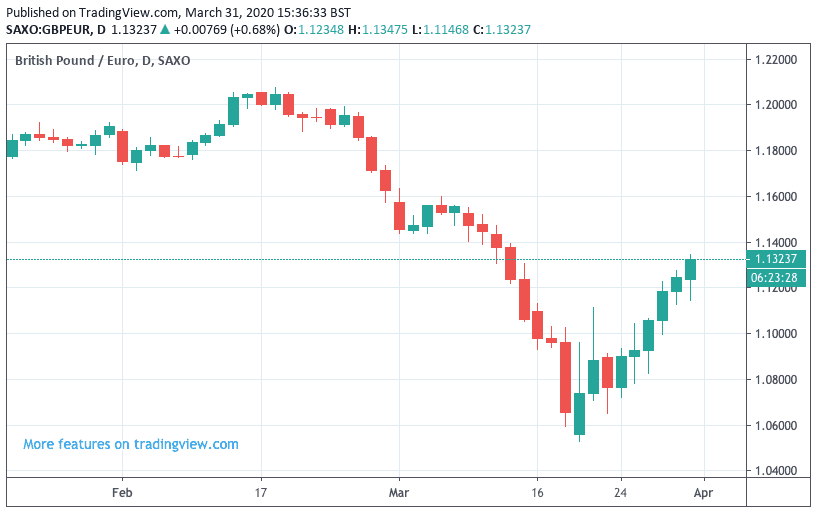Pound Sterling Surges into Month-End, Up 1.0% against Euro and Dollar Bloc
- GBP rallies over a percent against some majors
- Talk of Brexit transition extension
- Month-end rebalancing at play

Above: Boris Johnson appears by video link as he self-isolates owing to being infected by covid-19. © Andrew Parsons / No 10 Downing Street
![]() - Spot GBP/EUR rate at time of writing: 1.1340
- Spot GBP/EUR rate at time of writing: 1.1340
- Bank transfer rates (indicative): 1.1040-1.1120
- FX specialist rates (indicative): 1.1200-1.1240 >> More information![]() - Spot GBP/USD rate at time of writing: 1.2435
- Spot GBP/USD rate at time of writing: 1.2435
- Bank transfer rates (indicative): 1.2100-1.2190
- FX specialist rates (indicative): 1.2300-1.2320 >> More information
The British Pound extended a late-March rally into the final session of the month by notching up gains in excess of a percent against the Euro, Franc and the commodity Dollar bloc while also pushing above 1.24 against the U.S. Dollar.
The advance comes amidst potential month-end flows that apparently favour Sterling but it seems market chatter of the potential for an extension to the Brexit transition period owing to a collapse in progress owing to the coronavirus pandemic could be a significant driver.
The Pound-to-Euro exchange rate surged 1.12% to reach 1.1340 while the Pound was up by over 1.20% against the Canadian, New Zealand and Australian Dollars.
The U.S. Dollar is meanwhile showing some strength at month-end, but not against the Pound: the Pound-to-Dollar exchange rate is quoted half a percent higher at 1.2439.
The rally means the currency has more than halved the decline experoenced earlier in the month when Sterling found itself caught up in a massive global market sell-off linked to the spreading coronavirus pandemic.
The overall assessment by the analyst community is that month- and quarter-end flows are driving a rally in the U.S. Dollar as investment managers adjust their portfolios to adjust for foreign currency movements.
There could be an element of this dynamic impacting the Pound, which if true could see the gains prove to be short-lived as month-end flows are technical in nature and not necessarily built on any solid fundamentals.
However there is also some talk about developments on Brexit being supportive of the currency.
"Some chatter is making the rounds that the UK will be forced to ask the EU to delay the post-Brexit transition period by a year or two, because trade talks have apparently “ground to a halt” amid the coronavirus pandemic," says Erik Bregar, Head of FX Strategy at Exchange Bank of Canada.
Bregar says it is arguable that this development "is GBP bullish" and perhaps explains a large part of Pound-Euro exchange rate's advance since the broad U.S. Dollar funding issues began to abate over a week ago.
Above: Sterling continues to recover against the Euro.
Robert Howard, an analyst at Thomson Reuters says Sterling might get a boost if UK Prime Minister Boris Johnson asks the European Union for Britain's post-Brexit transition period to be extended by a year or two.
If he does, Howard says it would remove the GBP-negative risk of the EU and UK failing to agree a trade pact to begin Jan. 1, 2021 – the day after the post-Brexit transition period is due to end.
"Negotiations on a trade pact have ground to a halt amid the coronavirus pandemic; several British civil service sources told Reuters many officials previously focussed on the trade talks have been shifted to dealing with the coronavirus outbreak. On Monday, EU diplomats said they expected a transition extension request in May or June," says Howard.
However, a spokesman for Prime Minister Boris Johnson told a regular press briefing that the December 31 transition period deadline remains "enshrined in law".
However it is becoming increasingly difficult to see the government push ahead with a year-end Brexit, considering the significant hit to cashflow and operations experienced by both British and European firms during the ongoing coronavirus outbreak.
"Under the current circumstances, it is hardly feasible for British firms to adequately prepare for the UK's withdrawal from the EU, so Boris Johnson may very soon be forced to consider an extension of the transition period," says Marc-André Fongern, Head of FX Spot & Options at Fongern Global Forex. "Extending the transition period would indeed automatically lead to more uncertainty for UK firms. I think the Pound Sterling currently reflects such a scenario, at least to some degree."





